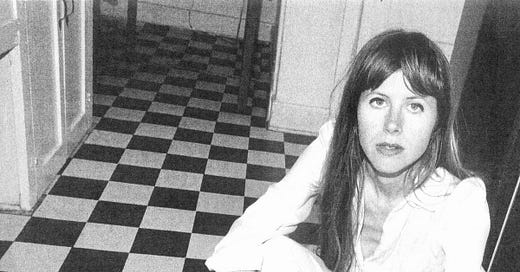What it means to fly away: Lael Neale's 'Altogether Stranger'
In her latest album, Lael Neale explores the sense of 'otherness' that pervades Los Angeles
★★★★
Lael Neale has done it again. On her latest record, Altogether Stranger, she effortlessly weaves between mourning the unsustainability of modern life in Los Angeles and a hopefulness for the future, all soundtracked by the twinkling of her faithful Omnichord.
Neale wastes no time in the opening track, ‘Wild Waters.’ She’s not once to mince words, and instead offers us short, snappy lyrics about the privatisation of natural resources and the desire for a simpler way of life - a hallmark of her minimalistic writing style.
The second track is where she really finds her stride. ‘All Good Things Will Come To Pass’ is almost a parody creation story, beginning with a simple stripped-back garage rock riff and a delightfully whimsical tambourine. In Neale’s world, man promises God he’ll take care of the planet, only to cross his fingers behind his back and make ‘a few adjustments’ to God’s plan - ‘amusement parks and prison yards / salad bars and shiny, shiny cars.’ The title is a repeated lyric in the track, part reassurance and part threat. In an interview with The Line of Best Fit, the songwriter explained, ‘I chose that line because I feel like society could go either way.’1 Either we’re on the brink of an awakening of sorts, or we’ve destroyed our only home.
The intrusive, repetitive quality of ‘Down On The Freeway’ mirrors the ceaseless buzz of Los Angeles, which was Neale’s home for more than a decade, and has become a central character in her music. Neale repeats ‘I’m one of us / I’m just like everyone else’ as if reciting her daily affirmations, which blankets the song in a layer of irony, considering that she has stated that otherness is a central theme of the record: ‘On returning to Los Angeles I felt like an extraterrestrial landing on a dystopian planet so I’m writing from the perspective of a being from another realm witnessing the peculiarities of humanity.’2
‘Sleep Through The Long Night’ marks a clear shift in tone as it slows down the tempo and takes on a more lullaby-inspired sound. The track begins with a twinkling flourish of the Omnichord, which then gives way to mournful, hushed vocals. The lyrics reflect a fascination with the parallels between the organic and the artificial, a recurring theme in both Neale’s music and her Substack, Consensual Sound. ‘My mind is a jungle of sirens and stop lights’ and ‘I’m heavy as plastic in the belly Atlantic’ are two standout examples.
The halfway point of the album is marked by the anachronistic-sounding ‘Come On,’ which refreshes us with a sense of urgency and a call to action: ‘even the bright sun will leave if we stop looking up.’ When I first listened to Lael Neale’s music back in 2022, I was shocked to find out she isn’t a time traveller from the 1960s, as her sound embodies so much of that mid-century California style - she is Joans Didion and Baez, alternating between heartfelt, diaristic songwriting and cool observations of the people around her. In a Substack piece accompanying the record’s lead single, ‘Tell Me How To Be Here,’ it appears she feels the same way: ‘I’ve always wanted to do something to make it better here, but it feels both too late and too soon. Too late because I missed the 60s when the word “peace” was fresh and uncontrived. Too soon because everything that gives me optimism for the future is a wish, a belief, as yet unproven by science and therefore meaningless to materialist minds.’3
The last third of the album offers us a clean and tidy conclusion to the themes of existentialism, melancholy and hubris that we’ve seen throughout the record. ‘New Ages’ is a classic rock-and-roll-inspired track backed by the gentle strum of a guitar, Neale’s voice soaring high above it. In contrast, ‘All Is Never Lost’ is another slow, dreamy track with a much more hopeful outlook. ‘When the world began / there was a light inside the man’ echoes softly over a ghostly instrumental.
‘There From Here’ marks a perfect conclusion to the record, using the metaphor of an airport as a form of purgatory. In this vacuous place, connection between individuals is an afterthought when we can be endlessly distracted by celebrity gossip magazines and reckless spending at the duty free section. Whereas some of the other songs on this album have employed a tongue-in-cheek sense of humour, ‘There From Here’ is refreshingly earnest.
Though it’s told from the perspective of someone who feels like an outsider, Neale’s character isn’t superior or judgemental. In fact, she’s part of the problem, distracting herself with empty pursuits: ‘I eat / but I’m always hungry.’ The closing words of the song are ‘sit beside me / here in economy / and wake me / before I go to sleep.’ It’s extremely touching and beautiful that a record predominantly about isolation in the age of constant connectivity ends with a direct request to another human being. It reframes the whole record - with just a little bit of effort and willingness to be vulnerable, we can overcome the barriers that have separated us from our fellow human beings. Perhaps Neale is a bleeding heart. Or perhaps she’s right, and all is never lost.
Thank you to In House Press for offering me a chance to listen to this record early and formulate my review. How kind! And how professional-feeling! You can find out more about them here.
Words taken from Orla Foster, The Line of Best Fit, April 29th 2025.





Pre-release listening!!! She's famous (and writing brilliant reviews